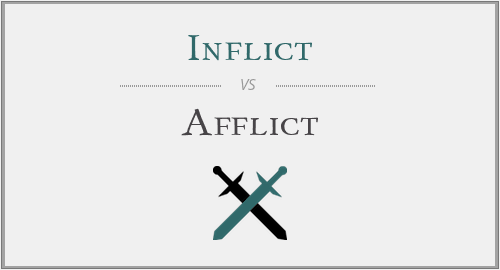Inflict” and “afflict” illustrates one of the most frequent linguistic confusions amongst English users. Not only do they have almost identical spellings, but their lexical significations also have a high level of similitude. If you’re not sure whether you should use “inflict” or “afflict”, or if you doubt that one is a misspelling, then this article is for you! You’ll find out everything you need to know about what “inflict” and “afflict” mean and how they can be used correctly in various contexts.
Inflict vs. Afflict
Both “inflict” and “afflict” function as verbs and are related to causing sufferance or pain. So, spelled almost the same, varying through the two first letters only, and also being so close with their meanings, what is making these words different and how do you remember which means what?
Well, the first answer is simple: the difference between “inflict’ and “afflict” is represented by the object of the verb. Both refer to causing pain, but while one’s object is a person, someone, the other’s object is something. We’ll clear this up in a few moments below, with relevant examples. As for how you can remember which word means what, we have prepared a short trick in the conclusion of the article, so don’t skip reading the end. It’s not difficult at all and it can be very helpful in correctly distinguishing “inflict” from “afflict”.
When do we use “inflict”?
“Inflict” defines the action of making someone suffer or causing pain and discomfort by doing something unpleasant or painful to them. The object of “inflict” is always something, not somebody. More exactly, you can inflict pain, suffering, discomfort etc. on someone, you cannot “inflict somebody with pain”. The object of the verb is always a noun such as “suffering”, “pain” etc., and never a person.
Example: I would never inflict such pain to my own family! – “inflict” refers to the action of making someone suffer by doing something unpleasant.
When do we use “afflict”?
“Afflict” has a quite similar meaning to “inflict”, also defining the action of making one suffer. But unlike “inflict”, “afflict” always has a person, someone, as an object, not something. Or, more exactly, “afflict” will also be followed by a pronoun or the name of a person: you can afflict him, her, someone else, but you can never say that you are “afflicting pain”. The object of the verb “afflict” is actually the person who’s being caused suffering. Moreover, we have to mention that “afflict” is a formal verb, unlike “inflict”, which is slightly more frequently used.
Example: The illness will definitely afflict the entire family, but there is nothing to do about it. – “afflict” refers to causing pain, discomfort or suffering in one, usually preceded by words such as “illness”, “pain” etc.
Conclusion
If you need a quick trick to distinguish these words, you can easily associate the verb “afflict” with the verb “affect”. They are similar and they both have a person as an object; “inflict” is the one that doesn’t have someone as an object, but something.
Anyway, a short, conclusive and relevant sentence that can help you correctly use “inflict” and “afflict” is that you can “inflict” pain on a person, and that pain will badly “afflict” that person. In other words, the object of “inflict” will always be something (pain, disease, illness, discomfort, suffering etc.), whereas the object of “afflict” will always someone, a person. So, in the end, yes, “inflict” and “afflict” have quite similar meanings, but they couldn’t be called perfect synonyms anyway, due to the different contexts where they are used with different functions. Remember to use them correctly in order to avoid future grammatical errors in your messages!





Have a discussion about this article with the community:
Report Comment
We're doing our best to make sure our content is useful, accurate and safe.
If by any chance you spot an inappropriate comment while navigating through our website please use this form to let us know, and we'll take care of it shortly.
Attachment
You need to be logged in to favorite.
Log In